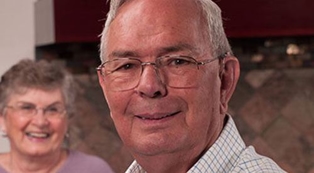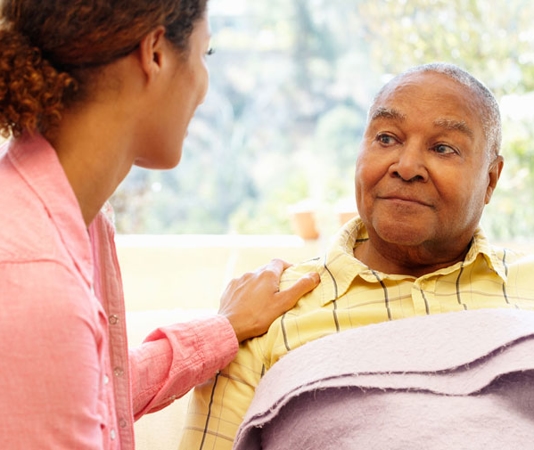 Within the world of caregiving there are many relationship dynamics – adult children caring for their elderly parents; parents caring for special needs children; a spouse caring for their partner, and many others.
Within the world of caregiving there are many relationship dynamics – adult children caring for their elderly parents; parents caring for special needs children; a spouse caring for their partner, and many others.
The circumstances of each caregiving experience come with different challenges, responsibilities, and rewards. The role of being a caregiver to one’s spouse can be particularly trying, especially if it comes well before the golden years.
Spouses with Alzheimer's
Karen Garner is a 42-year old mother of an 8-year-old and an 11-year-old. She also juggles a full-time job and providing dementia home care for her 50-year-old husband who has early-onset Alzheimer’s disease.
According to the Mayo Clinic, early-onset Alzheimer’s disease strikes people before the age of 65. It is very uncommon when it strikes someone before their 50s. Karen’s husband, Jim, had symptoms of the disease for at least two to four years prior to his diagnosis. Early-onset Alzheimer’s appears to be genetic; Jim’s mother and brother both had Alzheimer’s disease.
“I feel really bad for Jim,” Karen said. “I hate to see such a nice person go through this and to have my kids go through this.”
Karen says she is very concerned about whether or not her own children will inherit the disease.
“My whole purpose in life is to help find a cure before my kids get affected by it,” she said.
For now, she is dealing with day-to-day life as a caregiver to a husband in the prime of his life – he can no longer work and she cannot depend on him for basic things like remembering to put ice in a cooler.
“It is frustrating for me not to be able to rely on him like I used to,” she said.
Jim was always a multi-tasker – the first signs of his disease included the inability to remember five or six things at a time.
“He would say things completely out of character – things that didn’t make sense,” Karen said.
The most innocent question from the children can easily spiral into what she calls “a less-than-ideal parenting or marriage situation.” For example, one of the kids asked how speed limits were determined and Jim answered, “By the number of potholes.” Karen tried to answer correctly without putting her husband down in front of their children.
“I have to control my response to him,” she said. “It takes a lot for me.”
Right now, Jim is still able to safely drive the children to their nearby school and make something as simple as a peanut butter and jelly sandwich by himself.
“Anything that would require reading directions, he cannot do,” she said. “He used to be able to cook small, simple meals, like scrambled eggs. Then one time he put cinnamon in my eggs.”
When she questioned him about, he claimed she always liked cinnamon in her eggs.
“It is like a third child,” Karen said. “When you have a typical healthy child, they listen and learn, and you can punish them for not doing what you tell them to do. The difference is he is getting worse and you can repeat yourself 100 times and he is not going to remember and learn.”
Once a spousal relationship becomes more parental, a lot changes. The Mayo Clinic notes that loss of intimacy with a partner who has early-onset Alzheimer’s is common, and Karen admits it has changed the situation with husband.
“It’s not as intimate, definitely,” she said. “It’s not the same equal balance of responsibilities. It’s a changing type of marriage. Our roles have changed, but there is still a lot of love and respect and caring for each other.”
Although Jim remains very functional, Karen says her worries – about money, the responsibilities she compares to those of a single parent, and how rapidly his disease will progress – are exhausting. However, she remains practical.
“They say you go through a grief process – anger, denial, all of those things, and what’s been funny is I have just become realistic about it and the reason is because of my kids,” she said. “I can’t live in denial. I really had to put a lot of emotion away just because I can’t sit around all day feeling sorry for him and for me. I have to pay all the bills, keep the kids and the house organized, work full-time, and I don’t have time to go through all those things like you do when it’s an older parent or older spouse.”
If you care for a loved one with dementia or Alzheimer's, learn more about our Alzheimer's/dementia caregiving services today.



.1803151925550.jpg)

